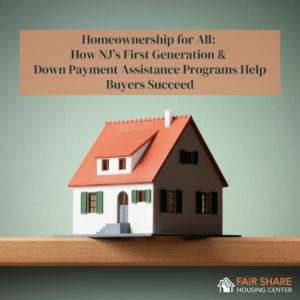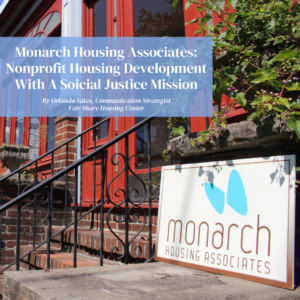A Reflection on the Fair Housing Act
April 20th, 2022
By Luke Hinrichs, Legal Fellow
In early August of 1966, Rev. Dr. Martin Luther King Jr. and fellow demonstrators were confronted by a white mob of counter-protestors during a march to promote open housing in Marquette Park in Chicago. The counter-protestors grew increasingly violent—throwing rocks, bottles, and bricks—and eventually struck King in the head. These perpetrators of violence were not Southern Segregationists refusing to yield their grip on a Jim Crow society, but rather they were white Northern residents resisting racial justice and the end to housing discrimination — a resistance that still exists today. King had moved to Chicago that year to join the Chicago Freedom Movement to address the long ignored and festering de facto segregation in the North.
In response to the violence that day, King said, “I’ve been in many demonstrations all across the South, but I can say that I have never seen—even in Mississippi and Alabama—mobs as hostile and as hate-filled as I’ve seen here in Chicago…I have to do this,” he continued, “to expose myself—to bring this hate into the open.”
Prior to and following the civil rights era, housing segregation was enforced, promoted, and passively permitted by federal, state, and local governments. Despite the success of the Civil Rights Act of 1964 and the Voting Rights Act of 1965, neither of these laws resulted in an immediate, significant change to the material and socio-economic existence of Black Americans, especially as it pertained to housing. Fair housing legislation was necessary to supplement that deficiency as housing was recognized as integral to employment, health, and economic mobility.
But the Fair Housing Act languished in Congress under filibuster and gridlock for two years. The comprehensive legislation could not overcome obstruction in Congress despite the efforts of civil rights activists and sympathetic legislators. A compromise eventually arose that weakened the legislation by eliminating HUD’s authority to hold hearings, issue complaints, and enter cease and desist orders, while also lowering the penalties for fair housing violations. Soon after the compromise was reached, the National Advisory Commission on Civil Disorders (“the Kerner Commission”) published its report on civil disobedience and riots which identified segregation and housing discrimination as a key cause of poverty, inequality, and unrest.
The Kerner Commission supported the passage of fair housing legislation and the report helped strengthen political consensus. But even with that support, many representatives at critical veto points still blocked the legislation. It was only after the tragic assassination of King on April 4, 1968 and the ensuing riots that the nation’s mood shifted and Congress moved to pass the legislation. The Civil Rights Act of 1968 (including Title VIII which is known as the Fair Housing Act) was enacted on April 11, 1968. For the first time in U.S. history, federal legislation banned racial discrimination in the sale or rental of housing.
It’s been fifty-five years since the Kerner Commission released its report, but so much of what it wrote remains true today. The Kerner Commission famously concluded that, “Our nation is moving towards two societies, one Black, one white — separate and unequal.” The report identified housing instability, low- and poor-quality housing supply, and segregation as root causes of the urban uprisings and violence in the 1960s. For the Commission, integration was the best path forward for future domestic policy while also recommending the creation of two million jobs for low-income Americans, continued federal intervention to ensure desegregation, immediate construction of 600,000 housing units in deprived “ghetto neighborhoods,” and expanded antipoverty measures. According to the Commission, both the current course of action and inaction would result in an “apartheid” like society in which the non-white and poor live separate from the white and affluent. The report was explicit in naming white racism and institutions as the architects and enforcers that created and maintained the segregated society. Commission members warned that America would be plagued by violence, civil unrest, and lasting inequality if a major commitment of federal resources was not rigorously applied.
While we’ve made significant strides since the passing of the federal Fair Housing Act, so much of what the Kerner Commission wrote still plagues our communities today. Far too often, around the country and in New Jersey, low-income communities and communities of color still experience housing discrimination and residential segregation. We still have a shortage of affordable homes across our state, in cities and suburbs alike, and federal and state investments in antipoverty measures are still not what they should be.
But there is hope. Just last month, Governor Murphy proposed a $335 million investment in the development of affordable homes throughout New Jersey and New Jersey’s Acting Attorney General took action to enforce the Fair Chance in Housing Act. And last week HUD Secretary Marcia Fudge began an internal agency process to evaluate policies and procedures that create barriers to housing for individuals with prior criminal legal system involvement. These are all signs that we are moving forward—toward the true values that the Fair Housing Act embodies.
April is celebrated around the nation as Fair Housing Month, recognizing the struggle for justice then and now. On the fifty-fourth anniversary, we must learn from the history of the Fair Housing Act, its meaningful impact, its shortcomings, and the current need for revitalization to address present and future housing challenges.






